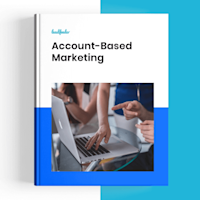It’s fun to talk about things you should do.
Take getting a puppy.
Sure, there are benefits — unconditional love, companionship, and unwavering loyalty.
There’s also the destruction of furniture, middle-of-the-night potty whines, and anytime-of-the-day surprises left throughout the house.
But, I mean, have you seen this puppy face? Or this one?
This one might actually be a seal.
At any rate, It’s easy to want a puppy when there are so many adorable pros. However, adapting to and training them is another story.
Account-based marketing software is a lot like a puppy.
It might not poop on your office floor, but you’ll have to “train” it (and your team) to raise it into the successful marketing strategy it can be.
It’s a process worth investing in for unwavering loyalty from your customers and near-unconditional love from your executive team.
Let’s talk “training” then. Specifically, how to build a list of prospects when you put together a winning account-based marketing campaign.
Note: You can’t evolve a strategy over time without a strategy to begin with — or the right Martech stack to drive it forward. Instantly see the leads you’re currently missing with our free 14-day trial.
Who is your ideal customer profile?
This is the question your team should be asking from the get-go. You can’t create a database of account and contact data without first understanding the right parameters.
In a nutshell, your ideal customer profile is someone that would benefit most from your sales offering — and provide your company with the most value from their purchase.
This “value” could be defined in any number of ways:
Revenue
Referrals
Testimonials
Feedback
Insights
Define someone who isn’t only a monetary win, but an advocate. Referrals are the gift that keeps on giving.
To develop your ideal customer profile, look at behavioral and firmographic data.
Narrow down finer details by evaluating trends across:
Your current customer base
Website visitors tracked using Leadfeeder
Your competitors’ users using BuiltWith
However you define your ideal customer profile, think of it as a hypothetical scenario. It’s the type of customer you want to attract the most.
In this way, ideal customer profiles are different from customer personas.
Personas represent the end-user. They vary and can help you tailor individual marketing campaigns, messaging, and new product features.
If an ideal customer profile represents the types of companies you want to target, customer personas are the individual people who work there.

How to identify your targeted accounts
Account mapping is an important part of account based marketing tactics. It helps your sales and marketing team visualize who key decision-makers are.
Plug your ideal customer profile and firmographic data points into a tool like BuiltWith. Then, compare the generated contact list with any contacts your team is already working with.
You can even import a list into Leadfeeder to receive notifications when someone from that list visits your website.

Third-party data will only paint part of the picture, so use it in conjunction with first-party data for more robust account based targeting.
Compare and analyze your customer base to guide you toward the types of accounts you should connect with in the future.
Interview current customers on pain points and their buying process. Don’t be afraid to uncover how your product or service is currently benefiting them (or not).
Feedback from decision-makers will help you create a clearer map of the business structure of your ideal customer.
Knowing about company hierarchy and decision-making processes will help you zero in on whose contact information you need to look for.
You’re trying to target the right companies — yes — but more importantly, you’re trying to effectively personalize messaging to specific company stakeholders.
How to build your sales target list
To create your sales target list, tools like LinkedIn Sales Navigator, LeadIQ, and Dealfront will be your friend.
If the generated list is too short, broaden the specifics of your ideal customer profile. Extend the revenue range, for example.
If the list is too large, create customer tiers. You can sort them based on revenue. Tiers help your sales and marketing teams allocate their efforts toward the most valuable contacts.
Teams should also be guided by Leadfeeder data around who is visiting your website and where they’re landing.
For example, a prospect from your top-line revenue tier visits your homepage. That’s great information to know.
But, it’s even better when a prospect slightly lower on the revenue tier lands on your homepage, blog, and product services pages.
It may seem logical to focus your efforts on top-line revenue prospects. But, you also want to be steered toward deals that are likely to close (quickly).
Use all of the data available to tailor outreach that’s personal and more effective overall.
Final thoughts: How to build your account and contact data
Once you’ve jumped the initial hurdles to build your account-based marketing strategy, the moving parts are still moving — constantly.
Just as you would regularly update a contact list based on your sales pipeline, you should review and revise your ideal customer profile regularly.
This means checking in on your website traffic data, examining closed-won sales accounts, and continuously gathering feedback from customers.
Note: You can’t evolve a strategy over time without a strategy to begin with — or the right Martech stack to drive it forward. Instantly see the leads you’re currently missing with our free 14-day trial.
Now that you're here
Leadfeeder is a tool that shows you companies that visit your website. Leadfeeder generates new leads, offers insight on your customers and can help you increase your marketing ROI.
If you liked this blog post, you'll probably love Leadfeeder, too.
Sign up








